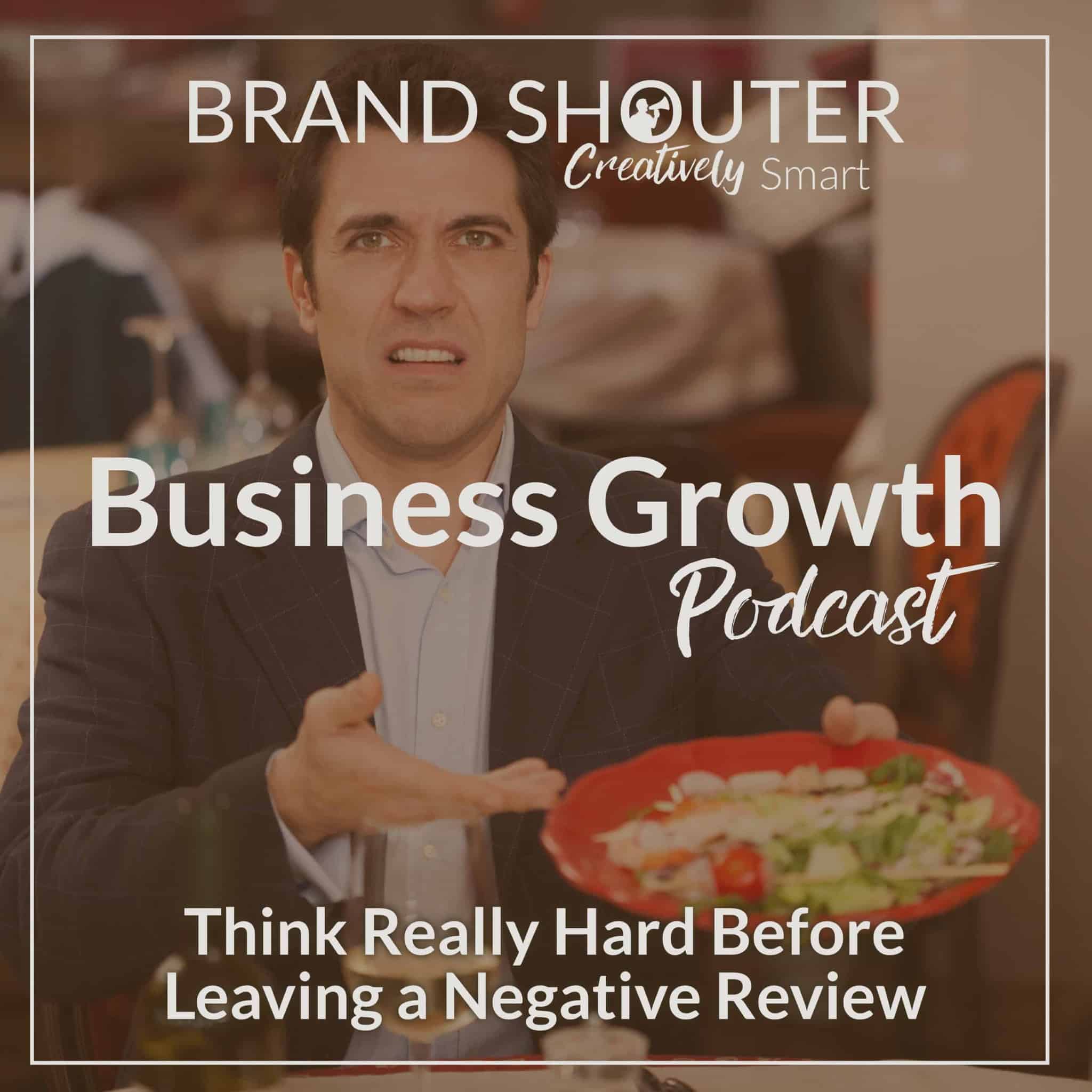Businesses can be made and broken on the backs of online reviews. It is so easy for anyone who has a bad experience to pull up a review site on their phone and leave a scathing review of the business that harmed their fragile psyche. I would like to submit the idea of thinking twice before leaving a review that could do massive damage to a small business trying to succeed.
Reputation Management
One of many services Wapiti offers is reputation management for my clients. It’s a really hard segment to work in, especially when you’re working from a negative place in the reviews, and so I usually have other people take care of this area.
There are tons of places that you can have reviews left depending on your industry. There are the standard ones like Yelp, Google My Business, TripAdvisor, and of course, Facebook. Then there’s the more niche ones, too, like Houzz.
An Eye-Opening Experience
I had one client in particular who was trying to solve some reputation issues that she had with her various businesses. I told her I would take some time to work on it and so I did a lot of the work myself. I’m familiar with reputation management, obviously, but as I mentioned, I don’t usually do it. So this time, actually taking the reins and doing it myself was kind of eye-opening in quite a few ways.

When you go to leave a review, you need to strongly consider the implications that review carries with it. One or two bad experiences hardly calls for ruining a business. If the business has enough positive reviews, then you’re not really going to hurt them with your negative review anyway. But a lot of smaller businesses only have a few reviews, and one negative review can flip it from being five stars to being two stars. Your one negative review could have so much weight that you actually destroy the reputation of a business online just because you had a bad experience.
Now let me be clear. I am not defending poorly run businesses, and I’m not saying that if you have a bad experience you should ignore it. I just think that a lot of people do not think through the implications of their online review and their online kibitzing.
How A Negative Experience is Probably Overblown
Here’s one example of a review that I’ve seen a lot working with that specific client, other clients we do reputation management for, and other businesses. This type of review is probably the most maddening to me. For example, let’s say it’s a restaurant (restaurants tend to be the ones that are super affected by reviews because people look them up online all the time). Someone will write a review saying, “I’ve been going to this restaurant for two years and I’ve never had a problem until today. I don’t know what was wrong with the server. She was the grumpiest person…” blah blah blah blah. Enter complaint. The complaint could be completely legitimate, but my question is: if you’ve been going there for two years, where is the positive review? Does this one or maybe even a couple experiences really justify ruining that business’s reputation when you’ve had two years of great service?
What ends up happening is that online review sites are actually inaccurate views of what you could expect because a business’s rating is simply an overall average of the good and bad reviews. By and large, people do not leave good reviews when they’ve had a good experience. I realize some people do, but a lot of people are more apt to be trigger-happy and leave a negative review when they have a bad experience. Therefore, if you take Amazon for example: for every negative review a product gets on Amazon, it has to have 10 times a good experience just to have a 50/50 good/negative split on reviews because by and large, people do not leave good reviews when they’ve had a good experience. That means that 10 people had to have a good experience to get on average one positive review, whereas almost every bad experience leads to a bad review. If you have 10 good experiences leading to one positive review and one bad experience leading to a bad review, you could be left with a 2.5 star rating. That’s a gross generalization, I realize, but hopefully you can see how it’s not hard to ruin the reputation of a business.

It is extremely hard for a business to build a positive healthy reputation. That’s good in some ways. However, it is bad when you consider that there are things such as human error – people who are having bad days for whatever reason – you just don’t know their life story; and if you did, you would probably be more apt to excuse and not lash out at the business purely because of one of the server’s having a problem. I just believe it’s important to think before you leave a bad review. And remember, on average, it’s going to take that business 10 times the amount of work to just balance it out.
A Local Example
Moving on to the example that I came up with today of a business unfairly hurting from bad reviews. We have a local UPS Store that I’ve dealt with quite a few times and I’ve only ever had a good experience. I was looking up their phone number to send a couple things in for printing and get them laminated. I looked them up online and their Yelp page came up right away. They have two and a half stars out of five reviews. (Now, this doesn’t include the reviews that Yelp has decided not to display – two of them being five stars and one of them was a ridiculous one star. I know Yelp supposedly has these algorithms for some reason but I’ve had perfectly legitimate reviews filtered out that I’ve left so I don’t really trust Yelp’s algorithms.)
Looking at the UPS store’s ratings more closely, we’ve got one guy who’s mad because they wouldn’t ship a piece of a firearm. It’s in UPS’s policy that they won’t. And there are reasons for that and the UPS Store owner actually responds basically saying they’re a franchise of UPS, they have to follow certain rules and cannot ship firearms, and that he even tried to explain this in the store. Maybe there’s a legitimate gripe there; but for me, it’s like, “Okay, they wouldn’t ship it. It’s a policy.” Is that really worth coming on and leaving a one-star review for them? It’s not like they wouldn’t serve that customer for racial or religious reasons for example. It’s purely that they do not ship things that are related to dangerous items that could have potential issues in the mail. And sure, maybe this piece was tame (scope rings for a hunting rifle), but sometimes there has to be a good blanket rule to cover everything.
The next one star review is from someone who said that they had a bad experience. I tend to think it’s a bit exaggerated, but that said, I’ll give some credence that maybe she actually had a bad experience with the employees. She said that she stated she felt the cost of something was excessive and then the employee snapped at her. Now this could be legitimate so I don’t want to judge that one too much. Then there was one that was basically saying UPS is so slow delivering a package they had dropped off. However, the UPS Store is not UPS. So that one star just ruined a small business person’s reputation online because they didn’t like what the greater company did. It’s a somewhat understandable confusion – UPS Store and UPS sounds pretty much the same thing, I get that. But in this case, it really just doesn’t apply. Then, of course, they use harsh words like, “They suck,” and stuff. That’s not helpful to anybody wondering what’s going on with the business.
The other negative review that they have, which is “not yet recommended” and hidden by Yelp’s filter, talked about a bad experience with USPS (the United States Postal Service!). So either they mistyped it and meant UPS or they actually put it on the wrong one. Either way. Maybe that’s why it was filtered off because it just didn’t seem too. I didn’t seem to apply but they also talked about doing a change of address which is generally a US Postal Service thing. Not a UPS thing.
So the UPS Store has four positive reviews (of which two of them are filtered out by Yelp’s filters). Then they have somebody who’s griping that they won’t ship a piece of a dangerous item, somebody who had a bad experience and said that they were over quoted (but UPS sets prices), somebody who says that the delivery service is too slow and therefore gets mad at the UPS store, and then somebody else who possibly isn’t even leaving a review on the correct business. In total, that’s four one-star reviews and four five-star reviews and they get a grand total of a two and a half star rating. That rating looks pretty bad in today’s day and age, yet if you go through and look at all those reviews, you could only give real credence to one, maybe two of the negative reviews.

Leave Positive Reviews Whenever Possible
I think more people should do positive reviews to help outweigh the junk. When you have a bad experience, you really need to stop and think. Is this worth potentially ruining a business over, was this experience indicative of the business as a whole, and do I really feel like I need to warn people against coming here? Or, did I just have a bad experience and therefore I’m going to personally choose not give patronage, but I won’t smear their reputation online.
Personal Examples
To wrap this up I want to leave a couple personal examples from my life. I went to a restaurant here in Stanwood that is still in business. I had what was probably the worst meal I’ve ever had in my life. My wife and sister-in-law who went with me agreed. So we told the manager that it was not good, and he said it was supposed to taste like that. He didn’t offer a credit or a coupon or anything. Even if we were wrong and our taste buds were all goofy, there was no customer service concession whatsoever. So I chose not to go back. It was one of the worst restaurant experiences I’ve ever had in my life purely from a quality of food standpoint.
If I had gone online and left a negative review, that would have severely hurt how the business looks online. But the business is still here today, which means that more than likely they’re doing okay. They’re making ends meet which means there are probably enough people that actually appreciate their food and like it. That means I was probably just an outlier, otherwise enough people would just stop going and the business would go under.
Another case from my life is I’ve actually started purposefully leaving positive reviews for good experiences. I could definitely be better at this, but it’s a start. Too many people have good experiences and just say, “Hey, that was good.” They may even tell their friends and they come back, but that doesn’t actually combat the negative online reputation that these businesses can get just from a few bad experiences.
Last Thoughts
I’m going to leave you with this thought. If you’re a business owner, you feel my pain. You probably know how easily a negative review can severely hurt your reputation. If you’re not a business owner and you’re listening to this, or even if you are a business owner, it is important to weigh the decision to leave a negative review before you make it. Don’t leave a negative review and hinder another business’s reputation when instead you can try to handle it internally and then just don’t go back. If you don’t like it, let that business fail on its own. Don’t push it over the ledge just because you didn’t enjoy your experience.









John says:
Why should a customer let shoddy or non-existent customer service slide, just to make your job easier and protect a business that has done a poor job? This article is propaganda at best. Heaven forbid we expect a business to actually do what they should… how outrageous! Dear god, If a business does not make it because it has failed to deliver an acceptable level of service, so be it. We don’t just get a gold star for turning up. This article is laughable.
Dan Ericson says:
John, I appreciate your comment although I think the comment is a case-in-point that proves what I’m trying to convey (my article being propaganda and all). Perception changes everything. Coming from a restaurant perspective, a waiter/waitress may be horrible on a visit which trickles down to food quality and overall perception of your experience. Does that mean the entire restaurant deserves a scathing review? Does it even deserve a 4-star review from one experience? Maybe that person just experienced a death in the family or is just having a lousy day. Maybe that employee is a dud. None of those make the business bad. As a small business owner, I can tell you that one negative review based on a single human-to-human interaction is rarely telling the full truth. Now if there is an established pattern, I can understand that and am all for a negative review (I’ve left a few in my lifetime). Just keep in mind that a tirade against a business can really hurt them and your experience can be (and often is) an outlier. The point of this article isn’t to defend bad business – it’s to encourage thoughtfulness before potentially ruining a business through the internet.
Bryce says:
This is just silly. If a company fails to deliver on its promise, they deserve a bad review. If someone buys a lemmon from a small dealership, that would be something that I would want to know. The dealership needs to make better selections. If my favorite place to eat is slipping somehow, I would want to know that. If I were a business owner and my employees were getting my business bad reviews, I would want to know that so that I could address the issues and be better. The fact is, we live in a liberated economy and the competition is tough!! A small company that wants to grow, isn’t going to let a silly rating get in their way. They take honest criticism and use it to figure out how to be the best, not dwell on it with thin skin. Toughen up Mr Evans, this is real life. Your approach is admirable, not realistic.
Dan Ericson says:
Good points Bryce. For me, I like to equate this to being a human being. In my life, I’ve made plenty of mistakes. If I had to walk around wearing a shirt with my mistakes plastered on them, it would be hard to make friends and connections. This is probably true of all of us. On the internet, people tend to compliment the good far less than they criticize the bad. Using your dealership example, what if the dealership sold one “lemon” by mistake? They may have sold 30 perfect cars before that and worked really hard to get one positive review from those clients . That bad car now gives them a 2.5 out of 5 star rating. Is this a fair view of the dealership?
Now, of course, if the dealership refused to do anything about it and said “tough luck” to the buyer – I totally get the negative review. As mentioned above, I’m not against negative reviews. The title of this article is “Think Really Hard Before Leaving Negative Reviews” not “Don’t Leave Negative Reviews”.
Lisa says:
Great article! In my experience as a small online business, less than 20% of customers leave reviews. While the majority of people do not bother to leave a review on a purchase they are happy with, EVERYONE wants to leave a review on a purchase they are unhappy with. This skews the overall rating by a very wide margin. The two guys who commented before me have clearly never run a business themselves and don’t know what they are talking about. If a customer is unhappy with their purchase for any reason, all I ask is that they contact me first and allow me to fix the problem for them before leaving their feedback. If after contacting me, they are still unhappy, then I totally deserve a negative review. However, the people who don’t at least email a seller first and allow them the opportunity to fix the issue before leaving a negative review on a small business (and during a pandemic) are just jerks.
Dan Ericson says:
Truth.
Josh says:
Interesting perspective…. Though I agree with this article, I also am curious to what our views are on business that aren’t brick and mortar or delivery style businesses. Say such as construction contractors. It seems that people would want to know if a particular company puts out good quality workmanship. It’s one thing to say that employees may have a bad day and be grumpy, or a clerk wouldn’t ship something because it’s against federal law, but what about a painter who is more or less a spray and go operation? Or the roofer who doesn’t know how to roof a house properly and doesn’t ice and water the valleys, or the doctor who is a hack or overly aggressive, or the mechanic who likes to charge for things not needed or does horrible work, or the vet who charges for things the customer didn’t want…. I could go on. Good work ethic is becoming lost, over-charging is the new norm in my opinion.
Dan Ericson says:
For sure, Josh. A lot of it depends on if people choose to stand by their work. If a painter does a bad job or a roofer doesn’t install a roof correctly, they should stand by their work and fix it and also cover any damages as a result. Insurance exists for these reasons to help protect them as well. Of course, I do think negative reviews are warranted sometimes. To stick with one of your examples, if a painter refuses to fix his shoddy painting, a negative review is warranted and potentially more.
My main focus with this article was to point out how easy it is to leave a bad review without a thought for anything else other than how we feel in the moment – not to suggest that we never leave negative reviews. Personally, I recently had to employ this very principle in my life with a product that I purchased. I desperately wanted to leave a horrible review for a horrible experience but, in the end, it was made right and all I lost was a few days of instant gratification and a few lines of text in correspondence.
M. Arai says:
This article is bullocks, full of misinformation misinformation and certainly bad advice. Don’t leave a bad review? Like that’s what the platforms are for. Get real.
Dan Ericson says:
Did you read anything I wrote? Even if you’re responding to just the title, it doesn’t say “don’t leave a bad review.” This comment is an example of not thinking before you leave a negative comment. Sort of sums my entire point up.
Cj lee says:
We know a business owner who was worried about a negative review. He’s also our dentist and his staff is amazing even though they don’t know we’re friends. I saw the impact from another perspective and decided to remove other negative reviews for other small businesses. I realize I’m not just dealing with an online review but someone’s livelihood. I’ll consider that in the future.
Mark says:
If they did a bad service and or didn’t deliver to their promise and you did what you could internally to resolve it (and hasn’t) then the business should get a bad review.
Dan Ericson says:
Absolutely. I agree. I left a bad review for a company just last week (the first one in a very long time) because they refused to fix a problem that was entirely on them. Giving them every chance to rectify a problem before the review is all I’m encouraging. So often, people have a bad experience and leave a bad review and just move on without giving the business time to fix the problem first.
Gloria says:
I read your article because I am seriously debating leaving a bad review for a hair stylist. I am 65 and have only once left a bad review before, whereby I didn’t write anything, just gave less stars. Typically I will only leave a positive review and usually when I have been asked or sent a link. This experience was just highly egregious. I had been going to this woman who calls herself a “hairipist” for around 6 months. She had done long layers and I was basically happy with the haircut, but never very impressed with her styling abilities. She could be somewhat “snarky”. I once simply mentioned I spoke to the receptionist and she yelled out “She’s the manager!” Yikes. There were several of these outbursts and I had been thinking about finding someone else. Then we had a hurricane and my appointment was postponed a week. When I showed up she got mad when I said I wanted an inch off (had not been cut for the second month), so basically an inch would be two months of growth (if your hair grows fast), She started berating me that we had gone over the appt. time and it needed at least an inch and a half and that is what she usually took off (highly doubt that). I think she snapped, because she managed to cut over 3 inches off and take almost the whole layering out. She made it so straight that I really could not tell when I left. I was upset, but thought maybe the smoothing made it look not layered. I did realize that night and decided to stop by in the morning and talk to the manager or receptionist about it. When I arrived no one was up front. I saw her with one customer and her friend (another stylist she is close with who had always also been snarky). She glares at me and then I go way to the other side and peek around the corner to see if the manager is there. She starts yelling across the room “why are you here! What do you want!!?”. I was far from her and the poor lady sitting in the chair. I meekly say I was upset because I couldn’t find any layers, when she screams again “It’s layered!!”. I walk away then and the receptionist appears. I ask her if she does hair and she says she just graduated, so I show her the back to ask if she thinks that is layered. She looks surprised and then suddenly the “hairipist” can leave her client (who was just getting a consult, not her hair done) and she screams at me again “This is so wrong! You cannot come in like this! You’re embarrassing me! This is so wrong!” I just shake me head and go to leave when her friend/stylist (who had no customers) screams at me “You’re fired!”. I go to leave and she locks the door behind me which is laughable because I am a 65 year old, 5’1″ woman and they are both way bigger than I am. I was just stunned at this experience. I took the time to write the owner (who has another salon and is rarely there) and send it certified. I know she signed for it almost a month ago and has never reached out to me. At this point, I would like your honest opinion if you think I am justified to leave a bad review? I am never one to hurt someone’s business (I worked in two family businesses), but also never treated a customer like that. I know Florida has Anti-SLAP legislation which makes it legal if you were actually a customer to leave a bad review and if they sue, you can counter sue for your legal fees. Please I would like your honest opinion. I felt gaslighted and abused by this incident.
Dan Ericson says:
This sounds like an awful experience – and one that would more than justify a poor review based on the details I am reading. I can’t speak to the legality aspect. That would be a conversation for a lawyer or someone much more legally inclined than I am.
MGMT Reputation says:
It is a great reminder to consider the impact of our words before leaving a negative review. Constructive feedback can be helpful, but it’s important to approach it thoughtfully and respectfully. Thank you for this insightful post!
Kathleen says:
What drives me nuts is people who clearly LOVE to leave bad reviews leading off with “I don’t normally leave bad reviews, but…” or “If I could give them 0 stars I would…” – I mean get real. We should be reviewing their review and giving it “0” stars.
Yes, some people do a horrible job at a place I purchased something from. That’s fine. I’ll just not go there again or maybe lower my tip, etc. I don’t want to leave a bad review typically, not just because then I get a bad reputation, but also because the business will get one as well even if it was just one bad day they had or one bad employee that might not work there any more.
If I do leave a low star or bad review, it’s typically because there was something of great concern to me that I think everyone needs to know about – for example, scamming someone out of money, threatening to sue people for not leaving them a 5 star review even when they failed to provide a healthy/safe environment as promised (actually happened to me at a rental I stayed at), employee attacking someone or using hate speech (owner needs to hear about it publically and announce they’ve addressed it in my opinion), owner attacks/uses hate speech (public needs to know about it so they aren’t put in harm’s way), got food poisoning, criminal/fraud activity/intentionally not delivering a package, etc.
Ok, I’ve definitely left a few low reviews in the past when the food tasted horrible (and I feel kind of bad about it now), but it was typically related to a large chain company that can definitely take care of themselves regardless of reviews and I didn’t call out specific employees or owners.
Rule of thumb stands and I agree with you, if the review isn’t going to help but actually will hurt everyone involved or serve no purpose but to make you feel better, probably good to just skip leaving a review all together.